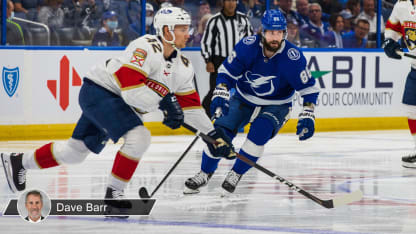One of the harder and more underrated parts of coaching is happening right now with the five teams that already have clinched a berth in the Stanley Cup Playoffs.
Coaches of those teams, plus others that will clinch their spots in the next week or two, are talking about the best ways to go about getting their teams ready to play in the Stanley Cup Playoffs without overdoing it during the final few weeks of the regular season.
The Florida Panthers clinched a berth into the playoffs April 3, when they had 13 games to play. The Colorado Avalanche clinched April 5, with 12 games still remaining on their schedule.
The Carolina Hurricanes, New York Rangers and Toronto Maple Leafs have since gotten in.
They all want to ensure they're healthy, rested and firing on all cylinders when the puck drops for Game 1. But it can be like walking a tightrope.
From my experience, the most important thing is to be clicking with individual and team confidence in the last three or four games of the regular season.
You want to have your forward lines and defense pairs feeling comfortable and confident. You may choose to rest a player or two in those final three or four games, but it's tempting fate because you want your Game 1 lineup clicking when you go into the playoffs.
In a lot of cases the teams playing well going into the playoffs are the teams that seem to win more, as long as they're not totally gassed.
This isn't a situation where you can just flip a switch and things change in Game 1. Managing the end of the regular season is key.
There will be situations before the playoffs where a player is banged up and there is a risk of putting him on the ice. But if players are healthy you want them playing and staying sharp.
It's also key to be managing goalies. You want the goalie who you know will be starting Game 1 to get some work, but you don't want to overuse him.
Tampa Bay Lightning coach Jon Cooper might have the toughest challenge.
The Lightning could push to finish as high as second in the Atlantic Division and open the playoffs with home-ice advantage. But how hard should they push? Is it worth it?
They have played 176 games, regular-season and playoffs combined, since the 2020 postseason began, more than any team in the NHL. They also have been about a .500 team for more than a month, going 7-8-2 since March 8.
Cooper has to be asking himself if he should play forward Nikita Kucherov 22 or 23 minutes per game just to help the Lightning start clicking again before the playoffs? Does he play forwards Brayden Point and Steven Stamkos like that too? Does defenseman Victor Hedman have to play 27 or 28 minutes per game? Should goalie Andrei Vasilevskiy start eight of the final 10 games just so the Lightning have the best chance to be clicking come playoff time, perhaps to the point where they pick it up enough to get home-ice advantage?
They're capable of going on a hot streak to get into second behind the Panthers. But is the reward worth the cost? Because he has to think about the back end of that too.


















